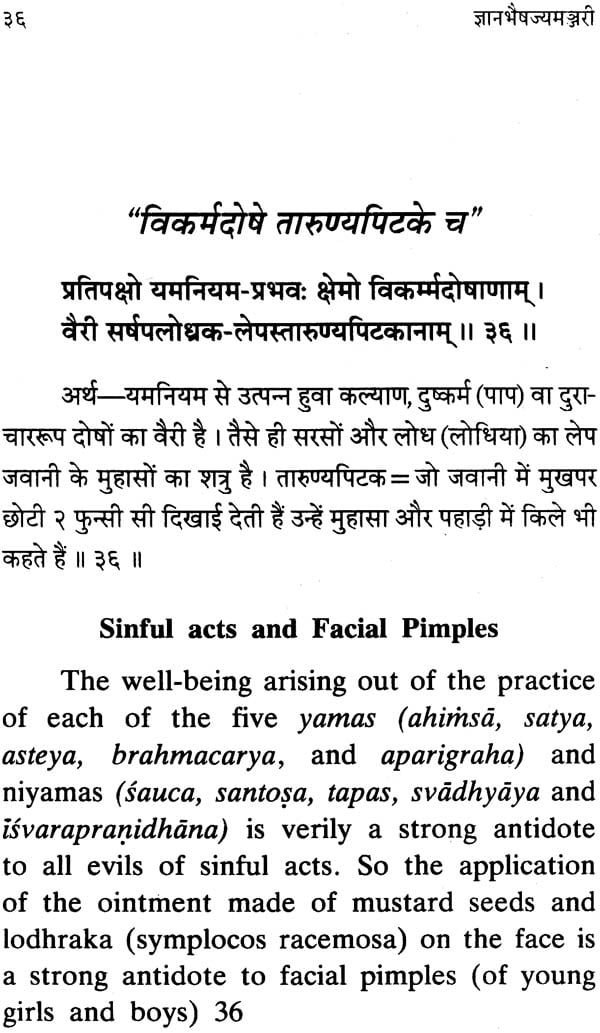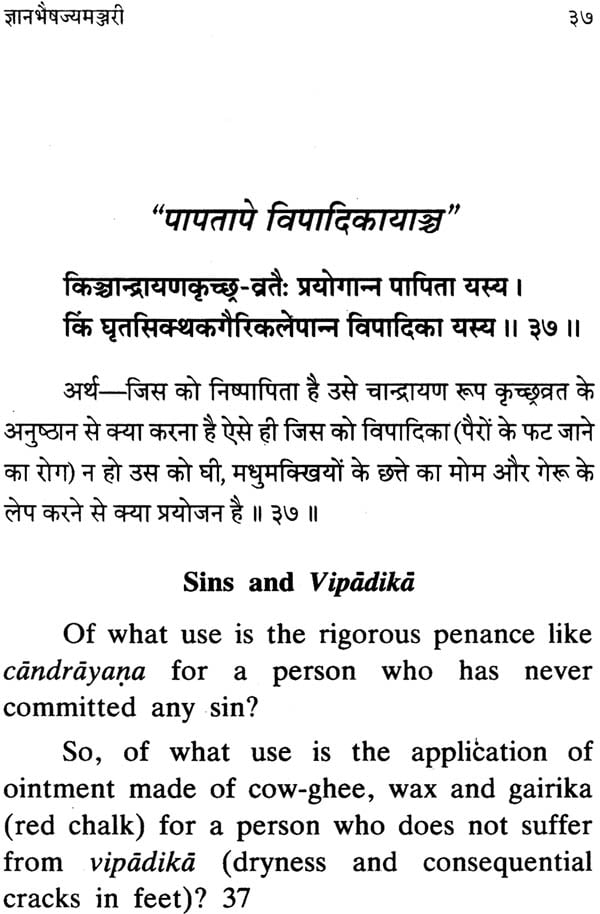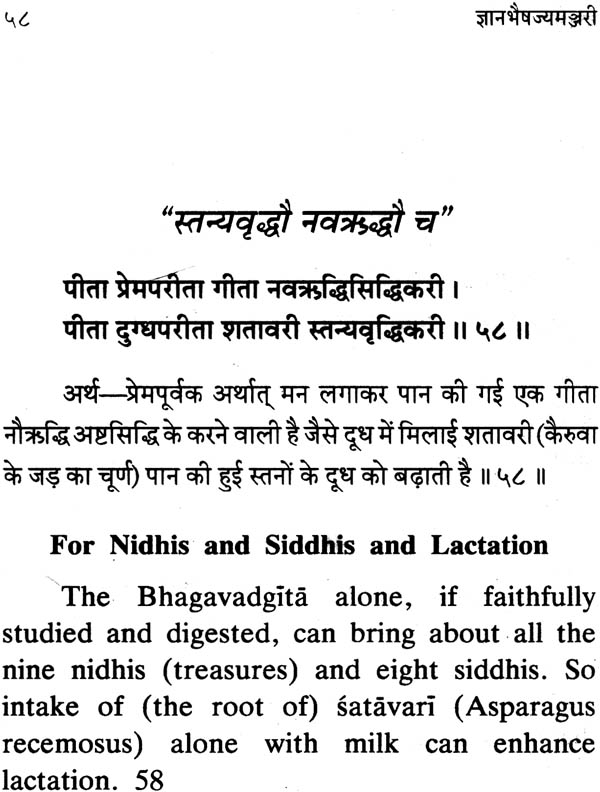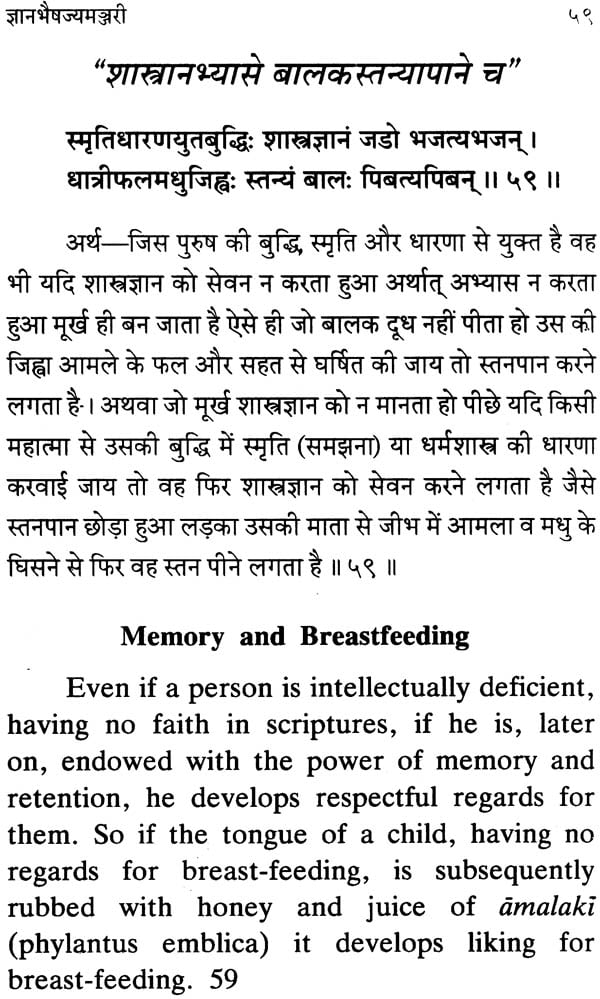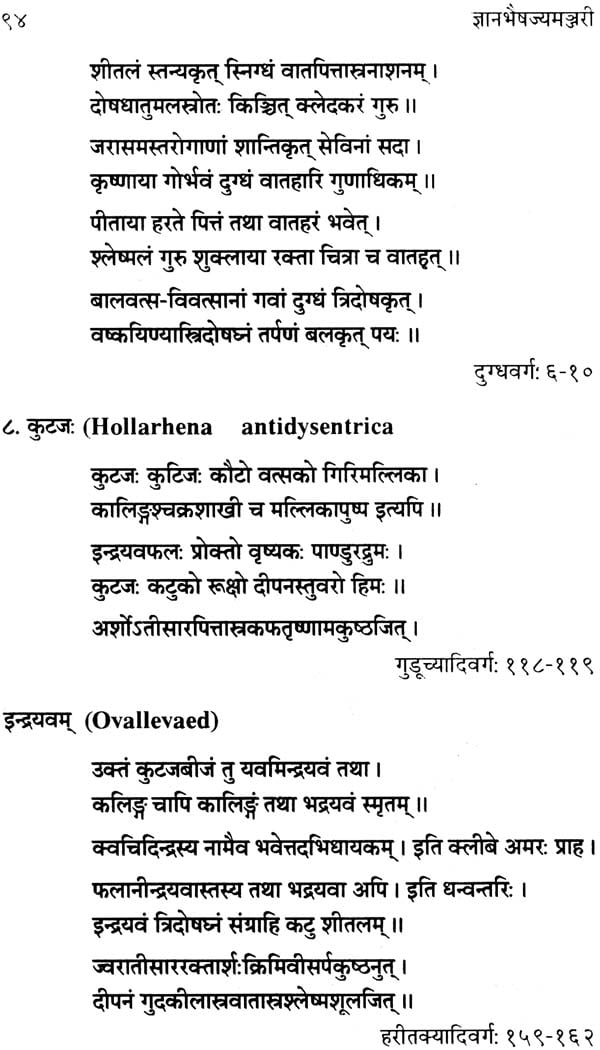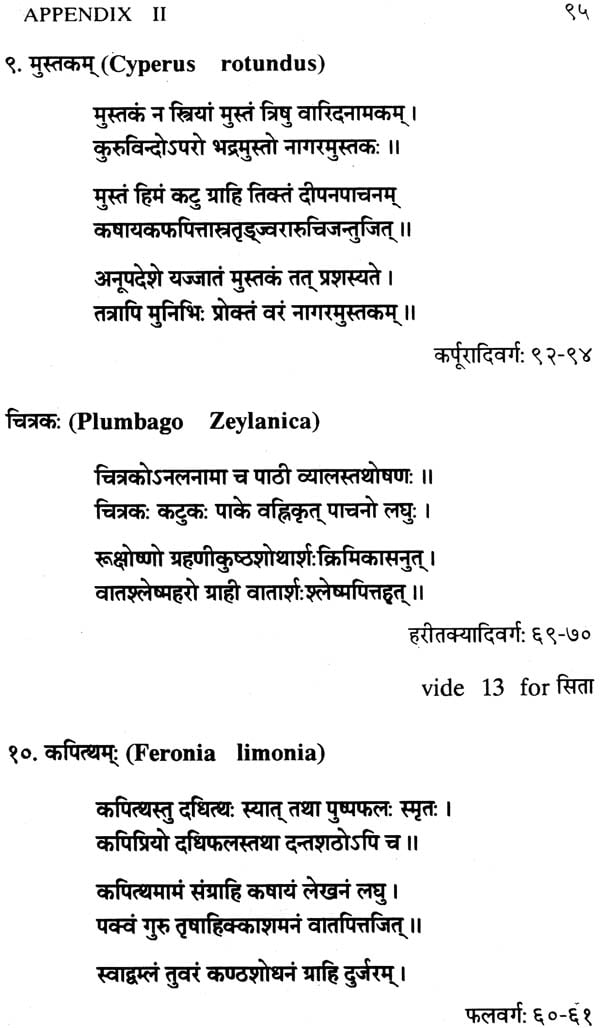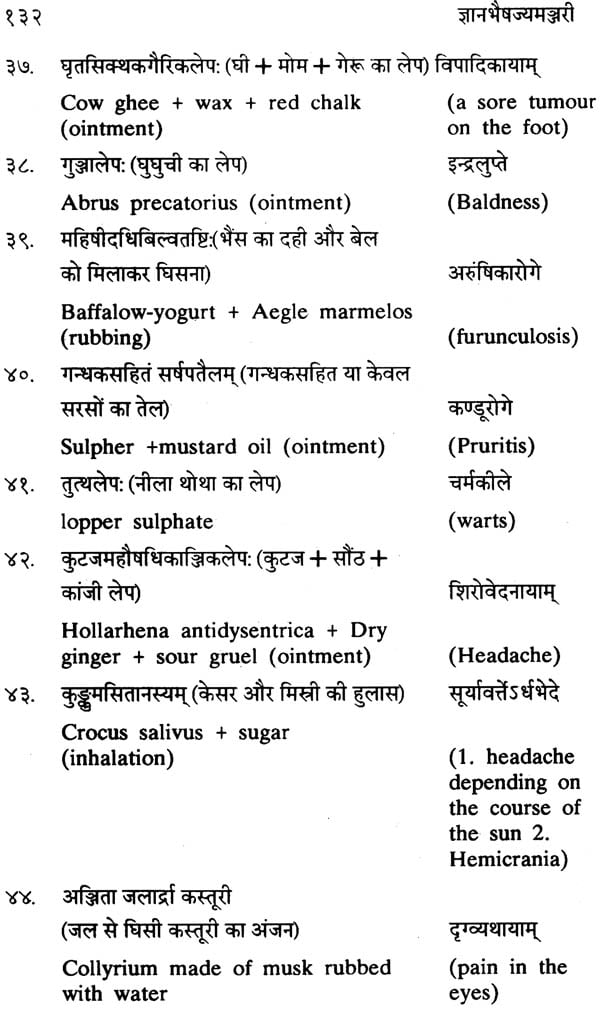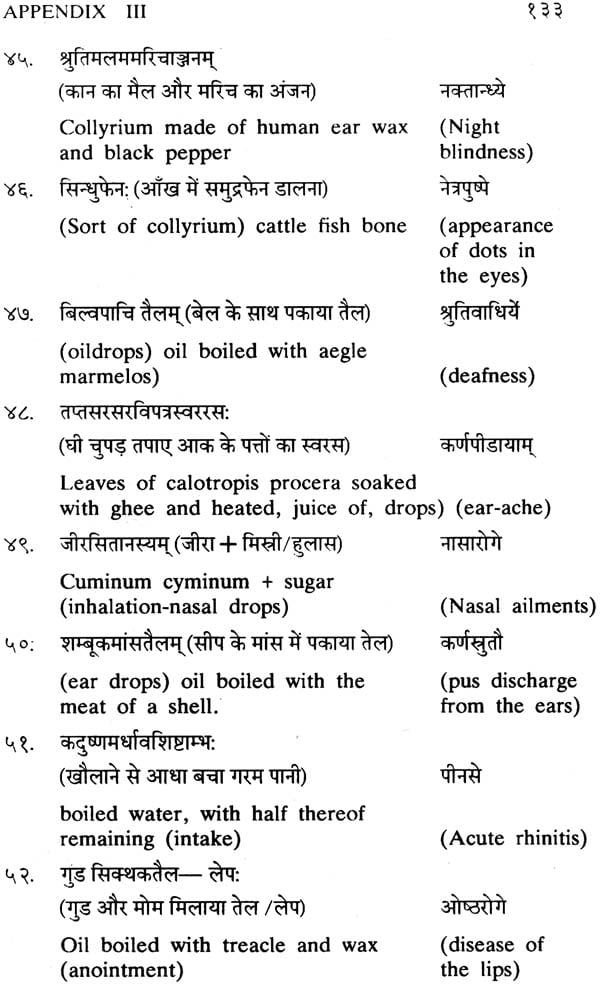
ज्ञानभैषज्यमञ्जरी Gumani Kavi's Jnanabhaisajyamanjar
Book Specification
| Item Code: | IDK267 |
| Author: | Ram Karan Sharma |
| Publisher: | Rashtriya Sanskrit Sansthan, Janakpuri |
| Language: | (Sanskrit Text with English and Hindi Translations) |
| Edition: | 2005 |
| Pages: | 142 |
| Cover: | Hardcover |
| Other Details | 8.9" X 5.8" |
| Weight | 360 gm |
Book Description
Foreword
I have great to present this volume of Golden Jubilee of India's Independence Series of Rashtriya Sanskrit Sansthan to our esteemed readers. The Volume verily represents the goodwill and cooperation, the Sansthan has all along been receiving from the distinguished scholars all over the country.
The Sansthan was established in October, 1970 as an autonomous apex body under the Ministry of Human Resource Development, Govt. of India with a view to promoting, preserving and propagating Sanskrit learning in all its aspects, with special reference to the in-depth shastraic learning. Apart from conducting the regular courses of studies at the constituent Vidyapeethas, it has been bringing out invaluable publications representing dissemination of knowledge contained in the various Shastras.
Thanks to the continued help, encouragement and support from the Ministry of Human Resource Development, Govt. of India that the Sansthan has grown by leaps and bounds and has been able to render its services to promotion of Sanskrit learning at national and international levels. Sansthan has decided to bring out 50 scholarly monographs by eminent Sanskrit Scholars of different fields as part of the academic programmes being organized to celebrate the Golden Jubilee of India's Independence.
The present volume Gumaani Kavi's Jnanabhaisajyamanjari is a spirituo-therapeutic poetic composition dealing with herbal prescriptions for various diseases. I hope the book will prove as a fresh addition to spiritual as well as Ayurvedic herbal therapeutic tradition of India.
The Sansthan is highly grateful to the learned author Dr. R.K. Sharma President, International Association of Sanskrit Studies for his valuable contribution in the form of present book as well as for all his invaluable services in various activities organized by the Sansthan for promotion and propagation of Sanskrit learning at national and international levels since its very inception.
The services rendered by my colleagues specially by Dr. Savita Pathak and Dr. Viroopaksha V. Jaddipal deserve special mention who have been working day and night for planning and organizing the various programmes connected with the Golden Jubilee Celebrations, particularly the publications of the Golden Jubilee Series. M/s Nag Publishers deserve our thanks for bringing out this monograph at a very short notice.
From the Jacket
Gumani Kavi's Jnana-bhaisajyamanjari is a unique aesthetic creation of the nineteenth century. It represents spirituo-therapeutic composition consisting of eighty or eighty two verses, mostly in the Arya metre. The first line is devoted to spiritual message, generally comprising devotion to Lord Rama (Ramabhakti) The second line deals with the corresponding therapeutic prescriptions (mostly herbal) for specified physical ailments. Thus apart from the spiritual tenets of eternal value, the work contains at least seventy seven herbal prescriptions (not too costly or cumbersome) for the various diseases or physical deficiencies. So this is a rare Sanskrit poetic composition combining in itself the excellence of Indian spiritual tradition as well as the Ayurvedic herbal therapeutic tradition.
Ram Karan Sharma (born March 20, 1927) was initiated to Vedic and allied studies (including Ayurveda) on traditional lines by Pandit Ambikadatta Sharma at Lokamanya Brahma-caryasrama. Muzaffarpur (Bihar). As a Fulbright scholar, he worked with Prof. M. B. Emeneau, at the University of California, Berkeley.
He has all along been making distinct contributions to promotion of Sanskrit Studies in all its aspects, as a teacher, educational administrator, and a writer. Areas of his special interest are Panini, Mahabharata, Darsana, Kavya and Ayurveda. His creative writings in Sanskrit include Sandhya (poetry), a recipient of Sahitya Akademi's award and Sima (a novel) a recipient of Bharatiya Bhasha Parishad award. More than one hundred research papers and about a dozen major publications, he has authored. He has been working on the Caraka Samhita (English translation of the text and critical exposition based on Cakrapanidatta's Ayurvedadipika) with Vaidya Bhagwan Dash as a co-author since 1963.
He was Founder Director, Rashtriya Sanskrit Sansthan. Presently he is the President of International Association of Sanskrit Studies.
| Verse No. | Page No. | |
| Foreword | vii-viii | |
| Introduction | ix-xxviii | |
| Text | 1-80 | |
| 1 | Invocation | |
| 2 | Bewilderment and Vatic fever | |
| 3 | Worldly Tension and Paittic fever | |
| 4 | Worldly misery and slaismic fever | |
| 5 | Three-fold Misery and Samnipata fever (Typhoid) | |
| 6 | Bondage and Visamajvara (Recurrent fever) | |
| 7 | Knots of the Heart and Jirnajvara (Chronic fever) | |
| 8 | World-Stream and Atisara (Diarrohaeo) | |
| 9 | Attachment and Aras (Piles) | |
| 10 | Ignorance and Sprue Syndronme (Grahani) | |
| 11 | Self-Realizaion | |
| 12 | Sins and Worms | |
| 13 | Worldly calamity and Raktapitta (Haemothermia) | |
| 14 | Bondage and Ksaya | |
| 15 | World-cycle and Nasaraktasruti (Nasal Bleeding) | |
| 16 | World bondage and (Kasa) Cough. | |
| 17 | Ego and Excessive Chikka (Sneezing). | |
| 18 | Doubts and Asthma (Svasa) | |
| 19 | Vices and Hoarseness of Voice | |
| 20 | False perspective and Aruci (Anorexia) | |
| 21 | Vanity and chardi (Vomiting) | |
| 22 | Illusion and Apasmara (Epilepsy) | |
| 23 | Worldly Defect and Amavata (Aithritis) | |
| 24 | Worldly Defect and Amavata (Aithritis) | |
| 25 | Fear from Miseries and Vatarakta (Gout) | |
| 26 | Birth-Cycle and Colic Pain (Sularoga) | |
| 27 | Worldly Cravings and Udavarta (Paralysis of Intestine) | |
| 28 | Miseries and Mutrakrcchra (Dysuria) | |
| 29 | Ignorance and prameha (Diabetes) | |
| 30 | Mental Agony and Oedema (Sotha) | |
| 31 | Worldly Miseries and Wounds (Vrana) | |
| 32 | Sins and Amlapitta (Acid Dyspepsia) | |
| 33 | Mental Dilemma and upadamsa (Venerial Diseases) | |
| 34 | Intellectual Deficiency and Kustha (Obstinate Skin Diseases) | |
| 35 | Evil Antecedents and Kunakha (Deformed Nails) | |
| 36 | Sinful Acts and Tarunyapitaka (Facial Pimples) | |
| 37 | Sins and Vipadika (a sore tumour on the foot) | |
| 38 | Ignorance and Indralupta (Baldness) | |
| 39 | Sins and Arumsika (Furuncuosis) | |
| 40 | Obstacles and Kandu (Prurites) | |
| 41 | Ignorance and Carmakila (Water) | |
| 42 | Worries and Headache (Siroroga) | |
| 43 | Kama and Krodha and Suryavarta (Headache depending on the sun) and Ardhabheda (Hemicrania) | |
| 44 | Vicious Designs and Drgvyatha (Optic pain) | |
| 45 | Malicious Designs and Naktandhya (Night-blindness) | |
| 46 | Calamities and netrapuspa (Eye-flower) | |
| 47 | Intellectual Dullness and Badhirya (Deafness) | |
| 48 | Mirage of False Hopes and Morbidities of Ears | |
| 49 | Greed and Nasaroga (Nasal Ailments) | |
| 50 | Sacrificial Violence and Karnasruti. (Pus Discharge from the Ears) | |
| 51 | Worldly ways and Pinasa (Acute Rhinites) | |
| 52 | Vanity and Ostharoga (Ailments of Lips) | |
| 53 | Sins and Tooth-ache | |
| 54 | Bewilderment and stomatitis | |
| 55 | Agnosticism and pradara (Moenorrhagia) | |
| 56 | Unripe Wisdom and garbhasrava (Miscarriage) | |
| 57 | Confusion and Prasavaroga (Delayed Delivery) | |
| 58 | For Nidhis and Siddhis and Lactation (Stanyavrddhi) | |
| 59 | For Memory and Breastfeeding (Stanyapana) | |
| 60 | Yogic Obstacles and Balaroga (Pediatric Problems) | |
| 61 | Mental Distortion and Leucoderma (Svitra) | |
| 62 | Sins and Palita (Grey Hair) | |
| 63 | For Yogic Powers and Aphrodisiac (Vajikarana) | |
| 64 | For Yogic Patience and promotion of power of Seminal Retention | |
| 65 | For Mental Control and Amorous satisfaction (Vasikarana) | |
| 66 | For Spiritual Brilliance and Virility | |
| 67 | For Spiritual Nonfulfilment and Garbhanirodha (Contraception) | |
| 68 | For closure of a wicked Person's Mouth and vaginal Constriction | |
| 69 | For Intellectual Growth and Kucadardhya (Breast-growth) | |
| 70 | For Liberation and treatment of Insomnia | |
| 71 | Impatience and Excessive sleep | |
| 72 | For Wellbeing and Kesavrddhi (Growth of Hair) | |
| 73 | Growth of Karman and Bodily Hair (Romanivarana) | |
| 74 | For Growth of Prakrti and (Kesavrddhi) Hair | |
| 75 | Ignorance and Snake-bite (ahivisam) | |
| 76 | Spiritual Deviation and Scorpio-bite (Vrscikavisa) | |
| 77 | Mental and Physical uncleanliness and Toxicity (Visa) | |
| 78 | Fears and toxicities and Intoxication (Visa, mada) | |
| 79 | Author's apology | |
| 80 | Concluding Remarks | |
| Appendix I Medicinal Plants | 81 | |
| Appendix II Relevant Quotations | 85 | |
| Appendix III Summary of Prescriptions | 128 | |
| Appendix IV Diseases | 138 | |
| Bibliography | 141 |
